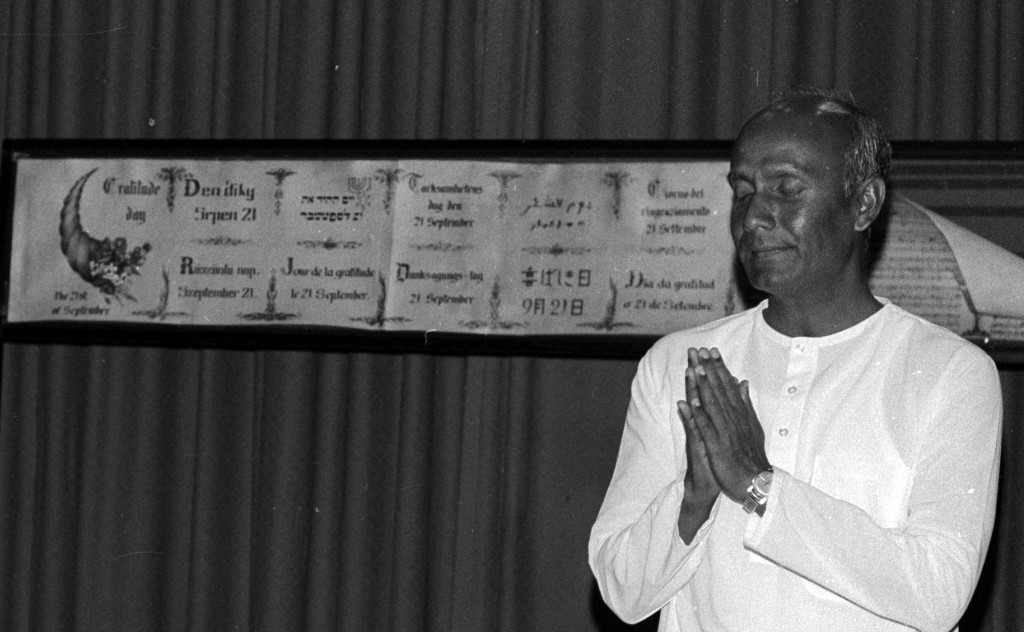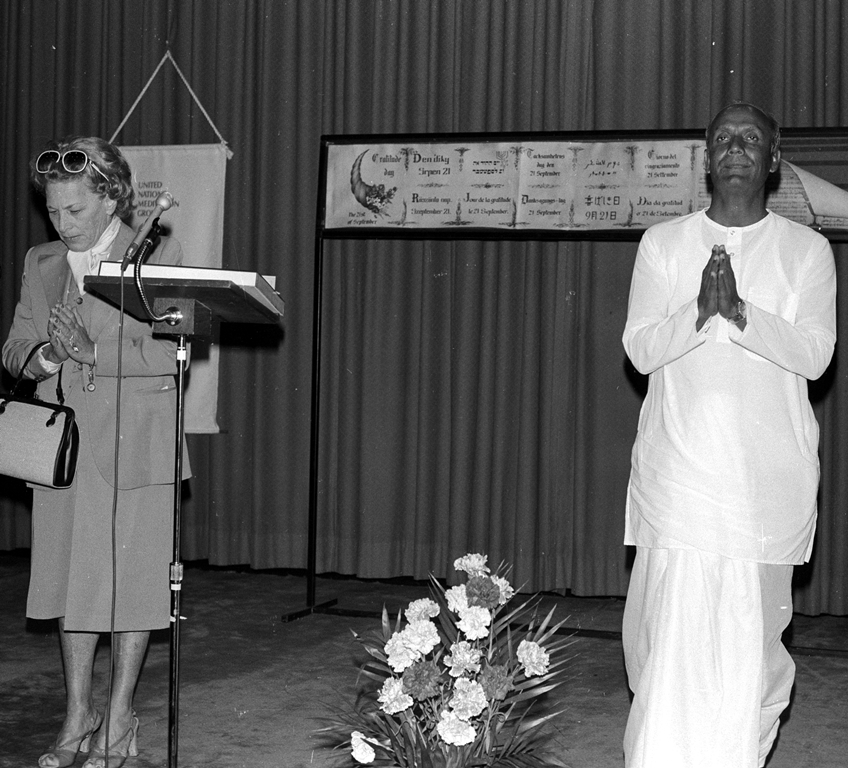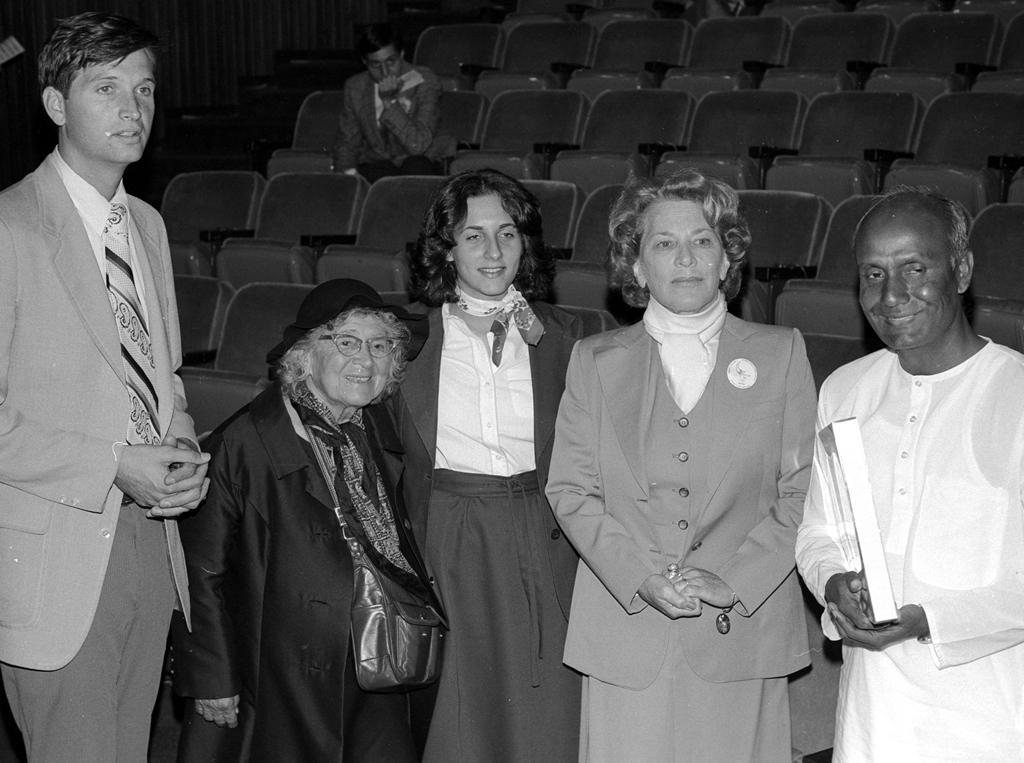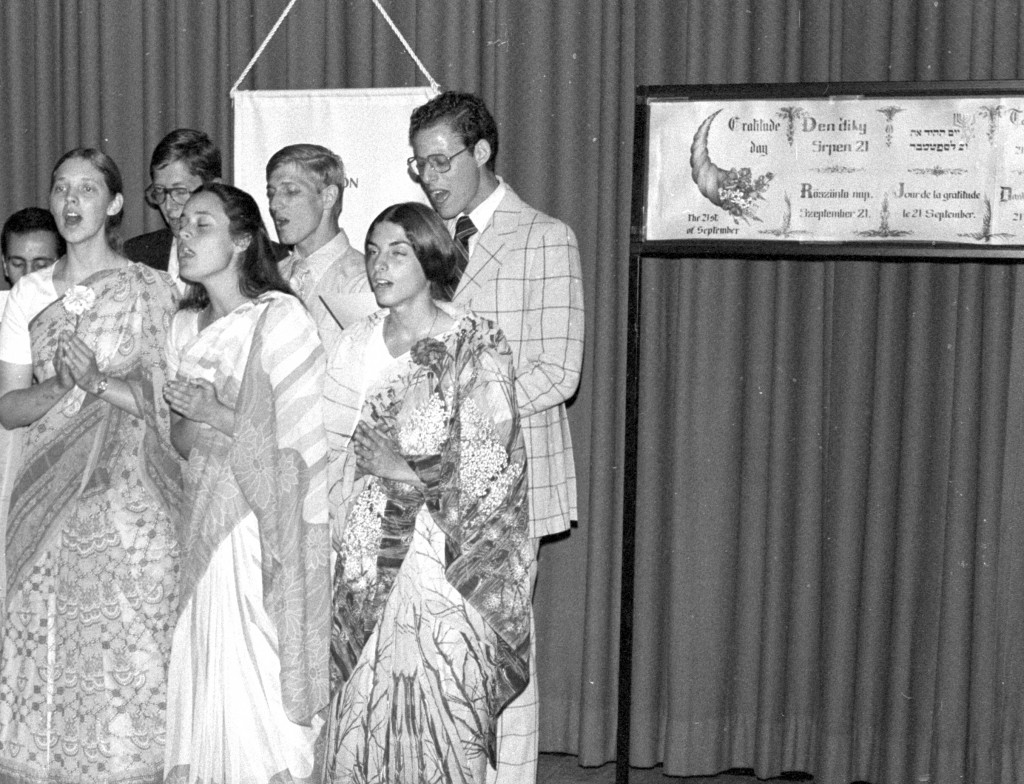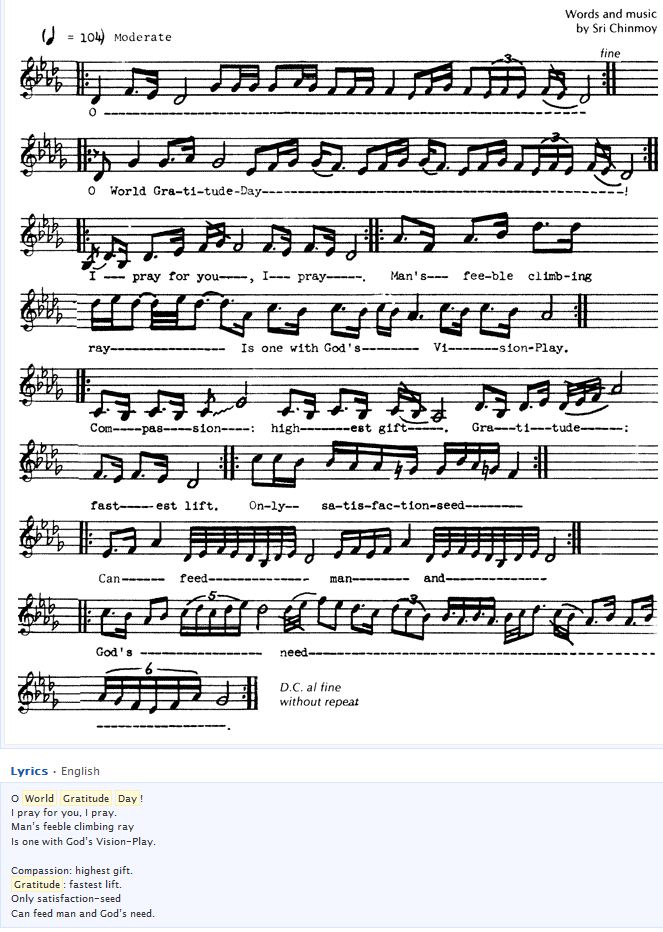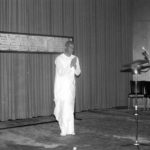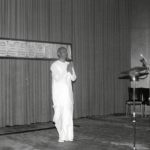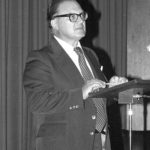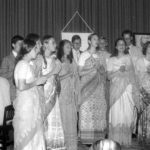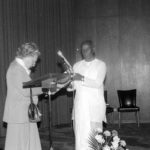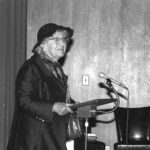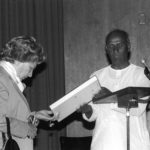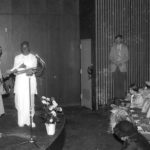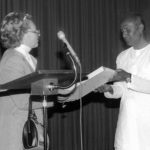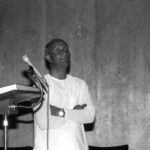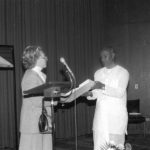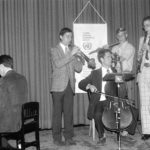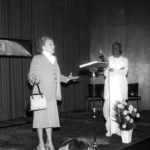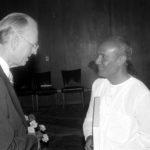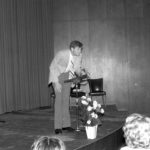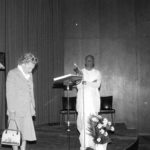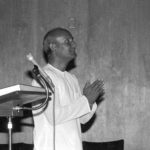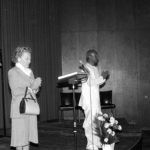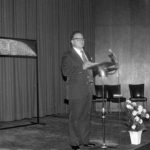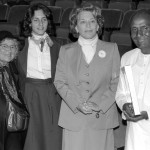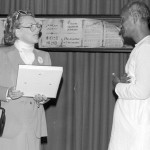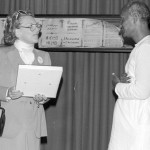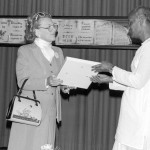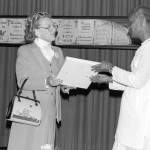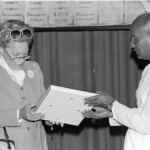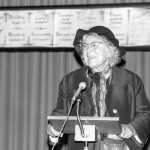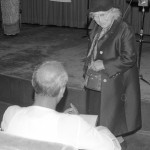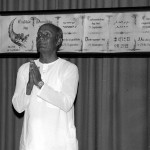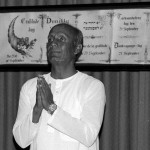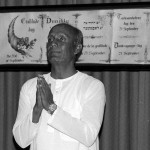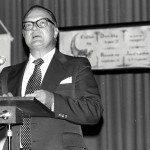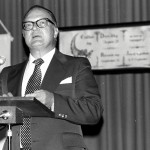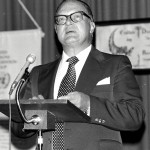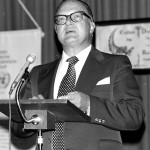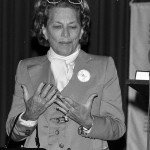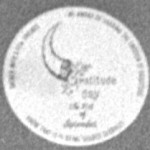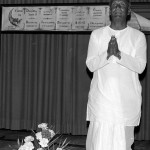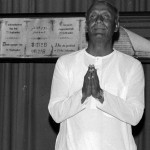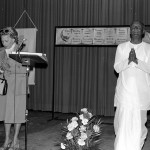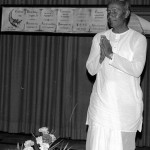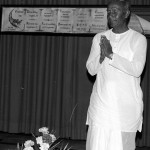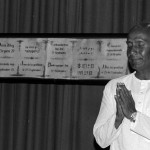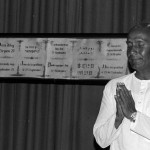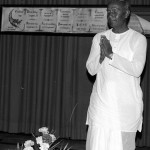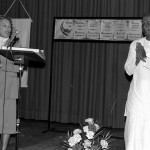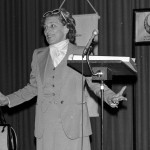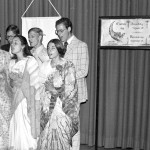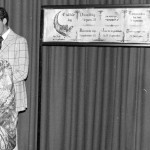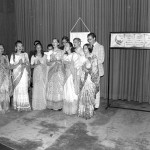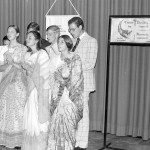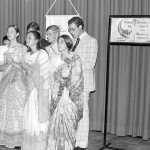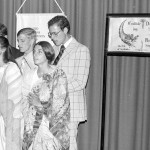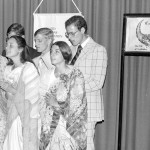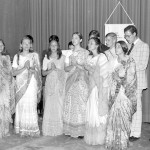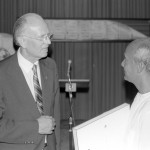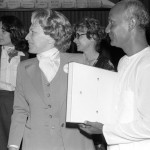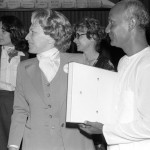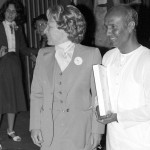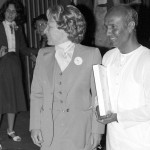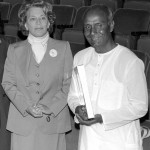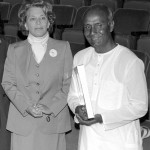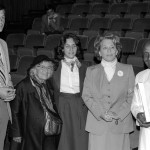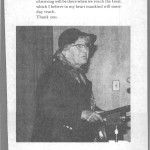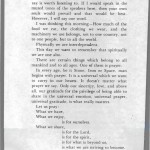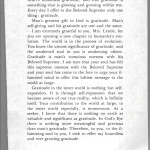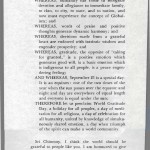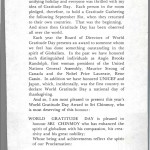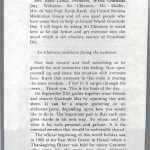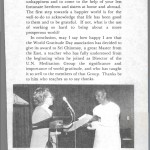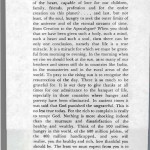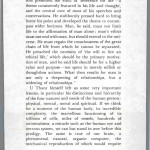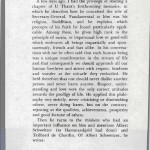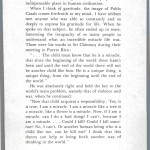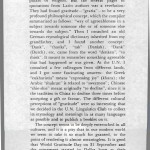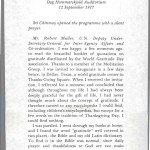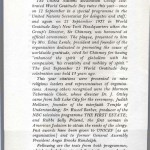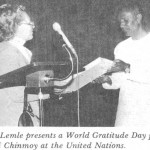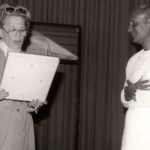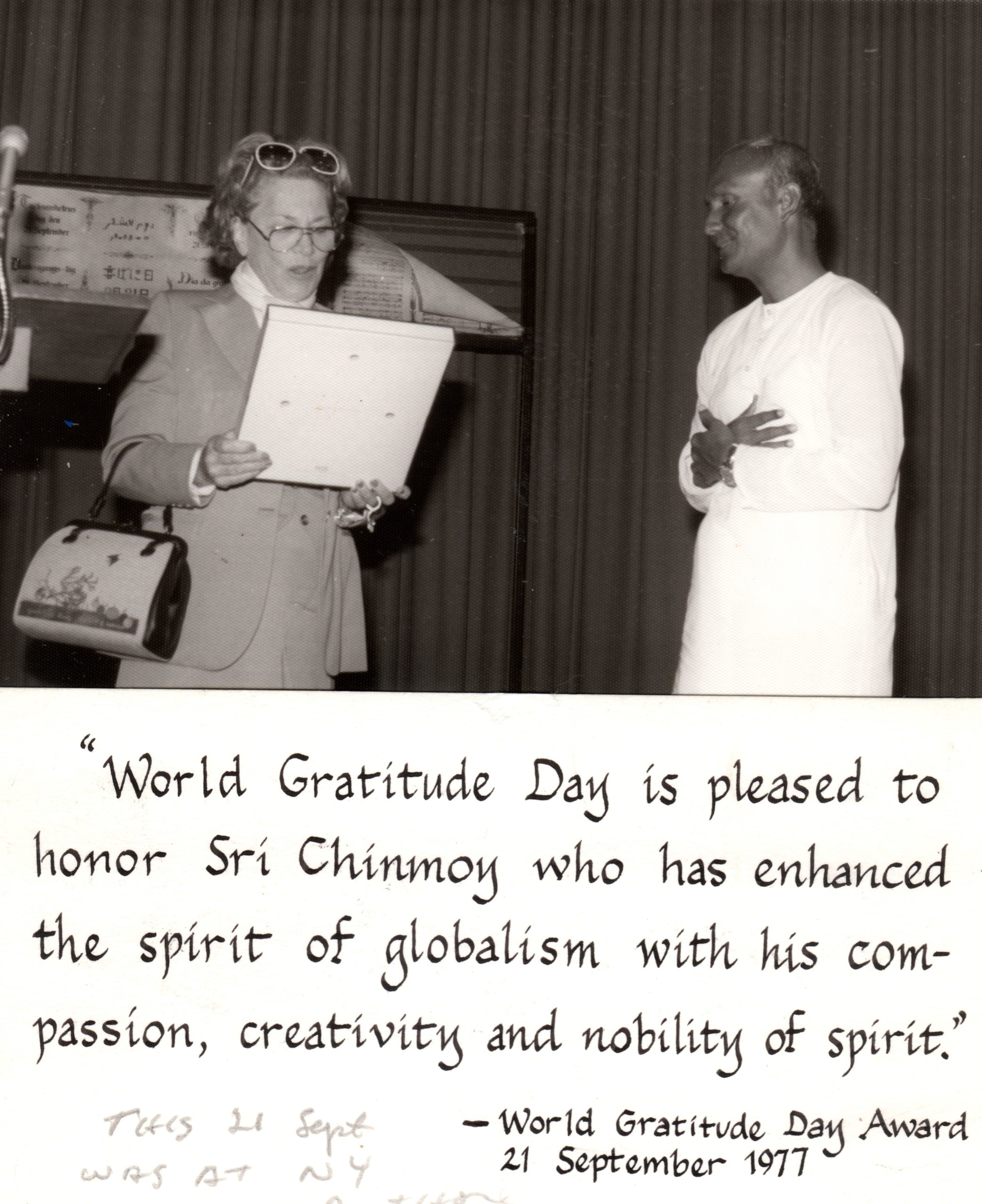World Gratitude Day -1977, Sep 12 at UN – DETAILS and PHOTOS
Filed under Community resources | Other Awards, Citations, Presentations | Thanksgiving - Gratitude | Thoughts from the UN community. | UN AnniversariesThe Meditation Group at the United nations celebrated World Gratitude Day twice in 1977
- one on 12 September in a special programme in the United Nations Secretariat for delegates and staff; and
- again on 21 September 1977 in World Gratitude Day’s New York Headquarters when the Group’s Director) Sir Chinmoy) was honoured at official ceremonies.
A Shorter Report combining both events is at :
World Gratitude Day -1977, 12 & 21 Sep events – SUMMARY
The plaque, presented to Sri Chinmoy on 21 September by Mrs. Edna Lemle, president and founder of the organisation dedicated to promoting the cause of worldwide gratitude, cited Sri Chinmoy for having “enhanced the spirit of globalism with his compassion, his creativity and nobility of spirit.”
The first September 21 World Gratitude Day celebration was held 13 years ago.
This year citations were presented to nine religious leaders and representatives of organisatzions. Among others recognised were:
- the Mormon Tabernacle Choir,whose director Dr. J. Ottley came from Salt Lake City for the ceremony;
- Judüh Hollister, founder of the Interfaith Temples of Understanding;
- Dr. Russel Barber, producer of the NBC television programme THE FIRST ESTA TE; and
- Rabbz· Sally Prisend, the first woman in American Judaism to attain the ranks of the clergy. Past awards have been given to UNICEF [as an organisation] and to former General Assembly Preszdent Angie Brooks Randolph.
Following is the text from the 12 Sept Programme.
The report on the 21 September programmer is at world-gratitude-day-1977-sep-21in-nyc-details-and-photos/.
Both programmes, included music and the performance by the Meditation Group at the UN choir of a song by Sri Chinmoy dedicated to World Gratitude Day.
U.N. HERALDS
WORLD GRATITUDE DAY
In the Dag Hammarskjold Auditorium
12 September 1977.
Sri Chinmoy opened the programme for World Gratitude with a silent prayer.
Mr. Robert Muller, U.N. Deputy Under-Secretary- General for Inter-Agency Affairs and Co-ordination:
I was happy, a few moments ago, to read the beautiful booklet of quotations on gratitude distributed by the World Gratitude Day association.
Thanks to a member of the Meditation Group, I was invited to inaugurate in a few days hence, in Dallas, Texas, a world gratitude center in Thanks-Giving Square. When I received the invitation, I reflected for a moment and concluded that although throughout my life I had always been deeply grateful for the gift of life, I had never thought much about the concept of gratitude. I therefore turned to any encyclopedia I could find, including children’s encyclopedias, but except for a few words on the tradition of Thanksgiving Day, I could find nothing.
I was puzzled. I went through my books at home, and I found the word “gratitude” well covered in two places: the Bible and my old Latin dictionary. To find it in the Bible was normal, sine e daily prayer and thankfulness to God are two main pillars of religion.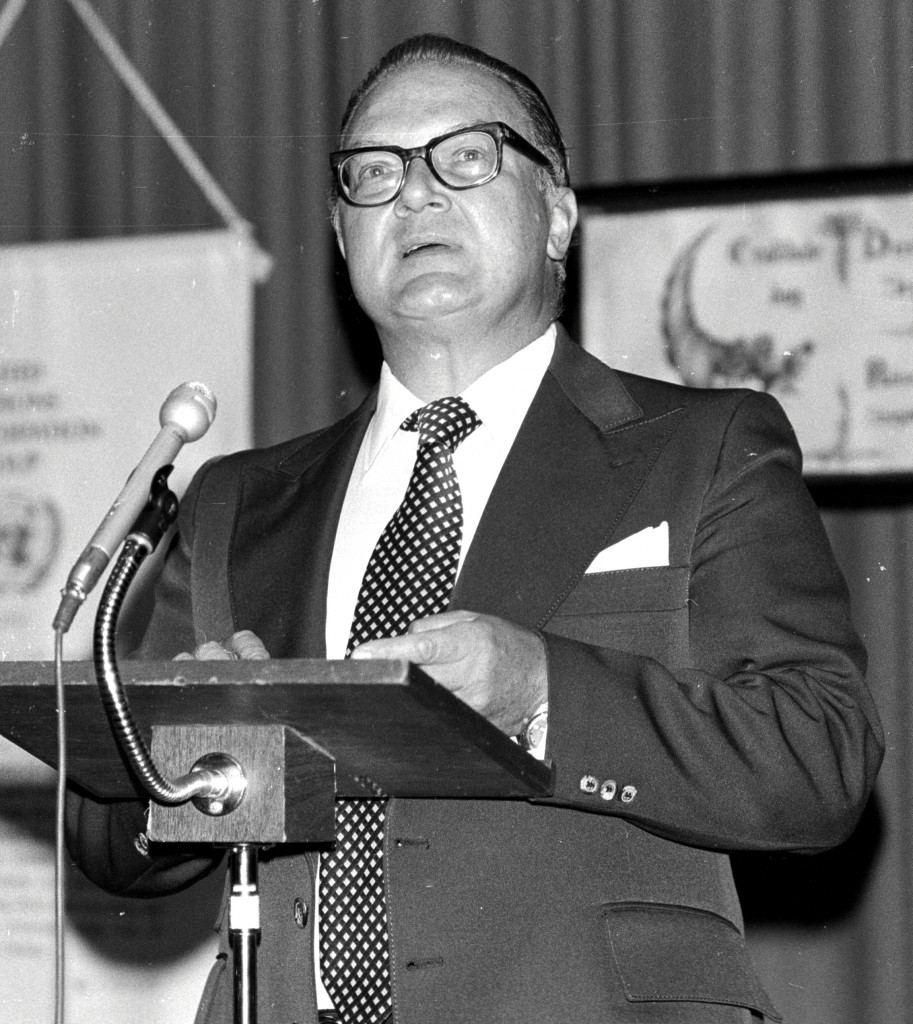
But the several pages of quotations from Latin authors was a revelation: They had found gratitude-“gratia” -to be a very profound philosophical concept, which the compiler summarized as follows: “way of agreeableness in a subject towards someone else or of someone else towards the subject.”
Then I consulted an old German etymological dictionary inherited from my grandfather, and I found another concept: “Dank”, “thanks”, “tak” (Danish), “Dank” (Dutch), etc. came from the word “denken”, “to think” .
It meant to remember something agreeable that had happened or was given. At the U.N. I consulted a few colleagues from different lands, and I got some fascinating answers: the Greek “eukharistia” means “expressing joy” (khara); the Arabic “shukran” is related to “sweetness” ; Chinese “shie-shie” meant origin ally “to decline”, since it is the tradition in China to decline three times before accepting a gift or favour.
The different cultural perceptions of “gratitude” were so interesting that we decided in the U.N. Linguistics Club to collect its etymology and meanings in as many languages as possible and to publish a booklet on it. The concept seems to be deeply entrenched in all cultures, and it is a pity that in our modern world we seem to take it so much for granted, to the point of rendering it almost meaningless.
It is good that World Gratitude Day on 21 September and the movement started in Dallas have as their objective to re-establish gratitude at its proper and indispensable place in human civilization.
When I think of gratitude, the image of Pablo Casals comes forthwith to my mind. I have seldom met anyone who was able so constantly and so deeply to express his gratitude for life. When he spoke on that subject, he often ended up in tears, lamenting the incapacity of so many people to understand what an incredible miracle life was.
These were his words to Sri Chinmoy during their meeting in Puerto Rico ( link to article) : ” . . . The child must know that he is a miracle, that since the beginning of the world there hasn’t been and until the end of the world there will not be another child like him. He is a unique “thing, a unique thing, from the beginning until the end of the world.” He was absolutely right and held the key to the world’s main problem, namely that of violence and war, when he continued: “Now that child acquires a responsibility: ‘Yes, it is true, I am a miracle. I am a miracle like a tree is a miracle, like a flower is a miracle. Now, if I am a miracle, can I do a bad thing? I can’t, because I am a miracle. . . . Could 1 kll? Could I kill someone? No, I can’t. Or another human being who is a child like me, can he kilI me?’ I think that this theory can help to bring forth another way of thinking in the world. ”
A few days ago, I had the privilege of reading a chapter of U Thant’s forthcoming memoirs, in which he describes how he conceived the role of Secretary-General. Fundamental to him was his religion, Buddhism, and he explains which precepts of his faith he found particularly applicable.
Among these, he gives high rank to the principIe of metta , or impersonal love or good-will which embraces all beings impartially and spontaneously, friends and foes alike . In his conversations with me he often said that each human being was a unique manifestation in the stream of life and that consequently we should approach all our human brethren and sisters with respect, kindness and wonder at the miracle they embodied. He held therefore that one should never dislike another person and never harm anyone. Respect, understanding and love were the only correct attitudes towards the prodigy of life. He applied this philosophy very strictly, never criticizing or diminishing others, never doing harm, but on the contrary, rejoicing at the qualities, achievements, prosperity and good fortune of others.
Then he turns to the thinkers who had an important influence on him and mentions Albert Schweitzer (as Hammarskjold had done) and Teilhard de Chardin. Of Albert Schweitzer , he writes: “In his Philosophy of Civilization, Schweitzer first presented the ethic of ‘reverence for life’ – a theme consistently featured in his life and thought, and the central core of most of his speeches and conversations. He stubbornly pressed hard to bring home his point and developed the theme to encompass wider horizons. Man, he said, must not limit life to the affirmation of man alone; man’s ethics must not end with man, but should extend to the universe. He must regain the consciousness of the great chain of life from which he cannot be separated. He preached the necessity of ‘the will to live an ethical life ,’ which should be the primary motivation of man, and he said life should be for a higher value and purpose-not spent in merely selfish or thoughtless actions. What then results for man is not only a deepening of relationships, but a widening of relationships.”
U Thant himself left us some very important lessons, in particular his distinctions and hierarchy of the four natures and needs of the human person : physical, mental, moral and spiritual.
If we think for a moment of the human body, its incredible complexity, the marvelous functioning of its trillions of cells, miles of vessels, hundreds of automatisms, a miracle such as the human eye and nervous system, we can but stand in awe before this prodigy. The same is true of our brain, a phenomenal natural, organic computer, the mechanical reproduction of which would require the volume of a cathedral. And what should we say of the heart, capable of love for our children, family , friends, profession and for the entire creation on this planet? . . . , and last , but not least, of the soul , hungry to seek the outer limits of the universe and of the eternal streams of time, from Creation to the Apocalypse?
When you think that we have been given such a body, such a mind, such a heart and such a soul, then there can be only one conclusion, namely that life is a true miracle. It is a miracle for which we must be grateful from morning to evening . In the morning when we rise we should look at the sun, as so many of our brothers and sisters still do in countries like India, in the monasteries and in the rural areas of the world. To pray to the rising sun is to recognise the resurrection of the day.
There is so much to be grateful for. It is our duty to give thanks at all times for our admittance to the banquet of life, especially in those countries where hunger and poverty have been eliminated. In ancient times it was said that God punished the ungrateful. This is no less true today. For the rich to complain is really to tempt God. Nothing is more shocking indeed than the murmurs and dissatisfaction of the healthy and wealthy. Think of the 500 million hungry in this world, of the 600 million jobless, of the 400 million handicapped, and you will realise, you the healthy and rich, how thankful you should be.
The least we must expect from you is to put an end to your lamentations, waste, greed and unhappiness and to come to the help of your less fortunate brethren and sisters at home and abroad. The first step towards a happier world is for the well-to-do to acknowledge that life has been good to them and to be grateful. If not, what is the use of working so hard to bring about a more prosperous world?
In conclusion, may I say how happy I am that the World Gratitude Day association has decided to give its award to ‘Sri Chinmoy, a great Master from the East, a teacher who has fully understood from the beginning when he joined as Leader of the Meditation Group at the UN the significance and importance of world gratitude, and who has taught it so well to the members of that Group.
Thanks be to him who teaches us to say thanks.
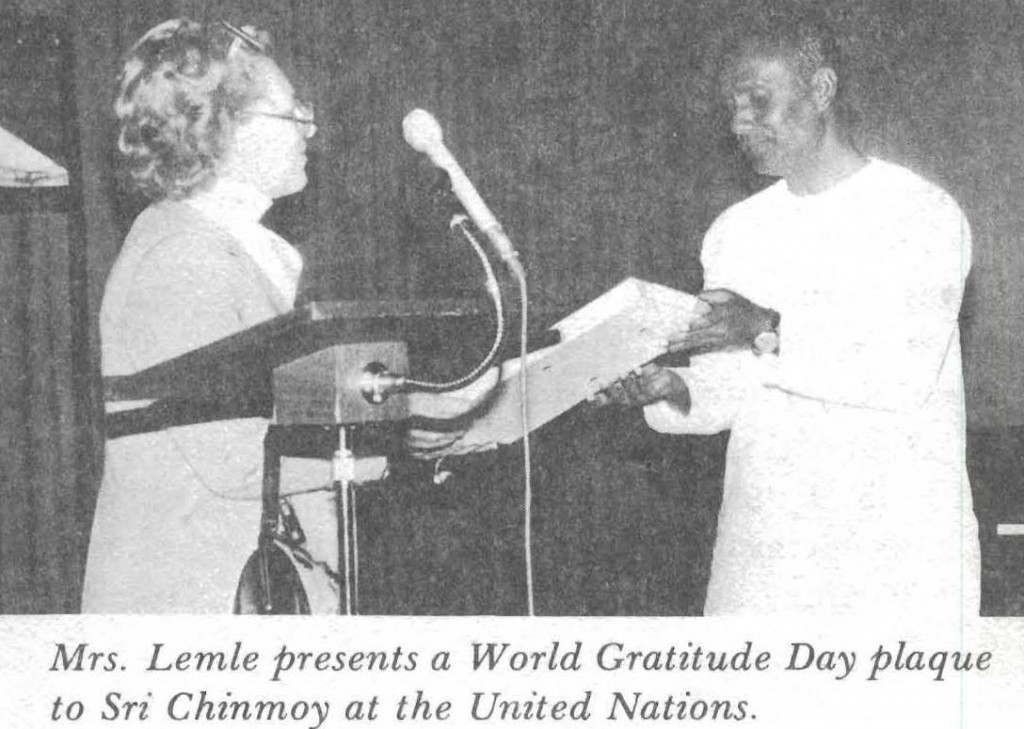 Mrs. Lemle presents a World Gratitude Day Plaque to Sri Chinmoy at the United Nations.
Mrs. Lemle presents a World Gratitude Day Plaque to Sri Chinmoy at the United Nations.
Mrs. Edna Lemle, Pressident, World Gratitude Day:
Welcome, Sri Chinmoy, Mr. Muller, Mrs. de Sola Pool, Kevin (Adhiratha) Keefe, the Meditation Group at eh U.N. and all you good people who have come here to help us herald World Gratitude Day. I will begin by asking Sri Chinmoy to stand here as he did before and get everyone into the mood which is the absolute essence of Gratitude Day.
(Sri Chinmoy meditates facing the audience.)
Now look inward and find something to be grateful for and remember this feeling. Now open yourself up and share this emotion with everyone here. Know that everyone in this room is sharing the same emotion . .. I feel it! It surges through the room … Thank you.
This is the basis of the day. On September 21st gather together some friends and observe Gratitude Day by repeating this ‘ with .hem. It can be a simple gathering or an elaborate party, depending upon how you would like to do it. T he important part is that each one gives thanks in his own way. To whom and for what is for each personal and private. It is the essential emotion that should be universally shared.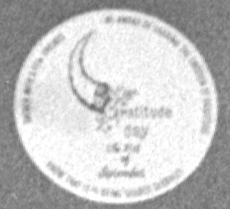
The official beginning of this world holiday was in 1965 at the East-West Center in Hawaii where a Thanksgiving Dinner was held for ninety Grantees who came for the most part from Oriental 14 countries. We discussed the need for a globally unifying holiday and everyone was thrilled with my idea of Gratitude Day. Each person in the room pledged, therefore, to hold a Gratitude Gathering the following September 21st, when they returned to their own countries. That was the beginning. And since then Gratitude Day has been observed all over the world.
Each year the Board of Directors of World Gratitude Day presents an award to someone whom we feel has done something outstanding in the spirit of Globalism . In the past we have honored such distinguished individuals as:
- Angie Brooks Randolph, first woman president of the United Nations General Assembly,
- Maurice Strong, of Canada and
- the Nobel Prize Laureate, Rene Cassin.
- In addition we have honored UNICEF and
- Japan, which, incidentally, was the first country to declare World Gratitude Day a national day of thanksgiving.
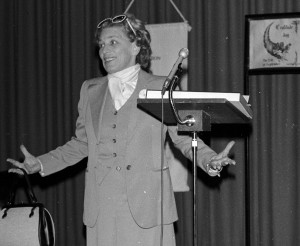 And so, I am most pleased to present this year’s World Gratitude Day Award to Sri Chinmoy, who is most deserving of this honour:
And so, I am most pleased to present this year’s World Gratitude Day Award to Sri Chinmoy, who is most deserving of this honour:
WORLD GRATITUDE DAY is pleased to honour SRI CHINMOY
who has enhanced the spirit of globalism with his compassion, his creativity and his great nobility;
Whose being and achievements reflect the spirit of our Proclamation:
- WHEREAS, humanity has come to recognize devotion and allegiance to immediate family, to clan, to city, to state, and to nation, and now must experience the concept of Globalism ; and
- WHEREAS, words of praise and positive thoughts generate dynamic harmony ; and
- WHEREAS, decisions made from a grateful heart are endowed with intrinsic wisdom and engender prosperity; and
- WHERAS , gratitude, the opposite of “taking for granted, ” is a positive emotion which generates good will , is a basic emotion which is indigenous to all people, is a peace engendering feeling ;
- AND WHEREAS, September 21 is a special day. It is an equinox : one of the two times of the year when the sun passes over the equator and night and day are everywhere of equal length and everyone is equal under the sun ;
- THEREFORE let us proclaim World Gratitude Day, a holiday for all peoples, a day of meditation for all religions, a day of celebration for all humanity, united by knowledge of simultaneously shared emotion, a day when triumph of the spirit can make a world community.
Sri Chinmoy, I think the world should be grateful to people like you. I am honoured to give you this award.
Sri Chinmoy: I am accepting this with my heart’s boundless gratitude, and this gratitude is something that is glowing and growing within me. Every day 1 offer to the Beloved Supreme only one thing: gratitude.
Man’s greatest gift to God is gratitude. Man’s self-giving and his gratitude are one and the same. 
I am extremely grateful to you, Mrs. Lemle, for you are opening a new chapter in humanity’s evolution. The world is in the process of evolution. You know the utmost significance of gratitude, and the awakened soul in you is awakening others. Gratitude is man’s conscious oneness with his Beloved Supreme. I am sure that your soul has felt this supreme oneness with the Beloved Supreme and your soul has come to the fore to urge your illumined mind to offer this loftiest message to the world at large.
Gratitude in the inner world is nothing but self expansion. It is through self-expansion that we become aware of our true reality, which is Infinity itself. Your contribution to the world at large, to the inner world especially, is momentous. As a seeker, I know that there is nothing on earth as valuable and significant as gratitude. In God’s Eye. there is nothing more meaningful and precious than man’s gratitude. Therefore, to you, to the illumining soul in you, I wish to offer my boundless and ever-growing gratitude.
Mrs. de Sola Pool: I don’t know if what I have to say is worth listening too. If I would speak in the muted tones of the speakers here , then your own souls would prevail and that would be best. However, I will say one word. 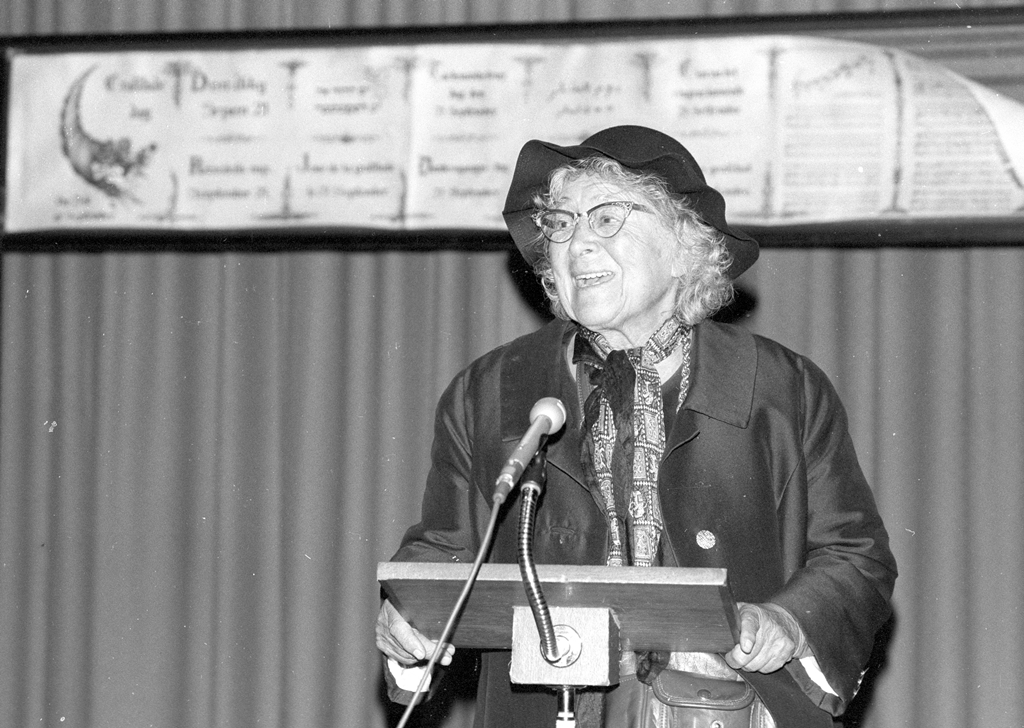
I was thinking this morning – How much of the food we eat, the clothing we wear, and the machinery we use belongs, not to one country, not to one people, but to all the world.
Physically we are interdependent.
This day we want to remember that spiritually we are one also.
There are certain things which belong to all mankind and to all ages. One of them is prayer.
In every age, be it Stone, Iron or Space, man begins with prayer. It is a universal which we want to carry in out hearts. It ·doesn’t matter what prayer we say. Only our sincerity, love, and above all, our gratitude for the privilege of being able to share in the universal emotion, universal prayer, universal gratitude, is what really matters.
Let us pray:
What we have, What we enjoy,
is for ourselves.
What we share,
is for the Lord, is for the spirit, is for what is beyond us,
is what we are striving to become.
And even if we are not here that day, our spirit of striving will be there when we reach the Goal, which I believe in my heart mankind will someday reach.
Thank you.
Peace Meditation at the UN Choir sings
Click to download PDF version of Text excerpted from, “Meditation at The United Nations” Sept 1977.
Click on image below for larger or different resolution photo / Image (jpg format)
- (c) Copyrights Sri Chinmoy Centre
- (c) Copyrights Sri Chinmoy Centre
- (c) Copyrights Sri Chinmoy Centre
- (c) Copyrights Sri Chinmoy Centre
- (c) Copyrights Sri Chinmoy Centre
- (c) Copyrights Sri Chinmoy Centre
- (c) Copyrights Sri Chinmoy Centre
- (c) Copyrights Sri Chinmoy Centre
- (c) Copyrights Sri Chinmoy Centre
- 1977-09-21-10-1.
- (c) Copyrights Sri Chinmoy Centre
- 1977-09-21-09-1.jpg August 31, 2018
- (c) Copyrights Sri Chinmoy Centre
- (c) Copyrights Sri Chinmoy Centre
- (c) Copyrights Sri Chinmoy Centre
- (c) Copyrights Sri Chinmoy Centre
- (c) Copyrights Sri Chinmoy Centre
- (c) Copyrights Sri Chinmoy Centre
- (c) Copyrights Sri Chinmoy Centre
- (c) Copyrights Sri Chinmoy Centre
- (c) Copyrights Sri Chinmoy Centre
- (c) Copyrights Sri Chinmoy Centre
- (c) Copyrights Sri Chinmoy Centre
- (c) Copyrights Sri Chinmoy Centre
- (c) Copyrights Sri Chinmoy Centre
- (c) Copyrights Sri Chinmoy Centre
- (c) Copyrights Sri Chinmoy Centre
- song-world-gratitude-day-sri-chinmoy.jp
- 77-92-05world-gratitude-mrs-lemle-ckg-crp
- 77-92-06-world-gratitude-ckg-meditates-crp-resize.jpg
- 77-92 -06-world-gratitude-ckg-meditates-crp-2
- 7-92 -05-world-gratitude-R-Mulle-resize
- 77-92 -05-world-gratitude-R-Muller-crp2-resize
- 77-92 -05-world-gratitude-R-Muller-crp2
- 77-92 -04-world-gratitude-ms-lemle-crp
- 77-92 -03-world-gratitude-ckg-meditates-2-resize
- 77-92 -02-world-gratitude-ckg-meditates-crp-resize-auto-cor
- 77-92 -02-world-gratitude-ckg-meditates-crp-resize
- 77-92 -02-world-gratitude-ckg-meditates-crp-2
- 77-92 -02-world-gratitude-ckg-meditates-crp
- 77-92 -02-world-gratitude-ckg-meditates
- 77- 92-05-resize-singers-world-gratitude
- 1977-09-12sep-world-gratitude-at-un-reading-out-in-advance-the-21-sep-plaque-crp-scaled.jpg
- 1977-09-12sep-world-gratitude-at-un-reading-out-in advance-the-21-sep-plaque
Gallery 2
- (c) Copyrights Sri Chinmoy Centre
- (c) Copyrights Sri Chinmoy Centre
- (c) Copyrights Sri Chinmoy Centre
- (c) Copyrights Sri Chinmoy Centre
- (c) Copyrights Sri Chinmoy Centre
- (c) Copyrights Sri Chinmoy Centre
- (c) Copyrights Sri Chinmoy Centre
- 1977-09-21-09-1.jpg August 31, 2018
- (c) Copyrights Sri Chinmoy Centre
- 1977-09-21-10-1.
- (c) Copyrights Sri Chinmoy Centre
- (c) Copyrights Sri Chinmoy Centre
- (c) Copyrights Sri Chinmoy Centre
- (c) Copyrights Sri Chinmoy Centre
- (c) Copyrights Sri Chinmoy Centre
- (c) Copyrights Sri Chinmoy Centre
- (c) Copyrights Sri Chinmoy Centre
- (c) Copyrights Sri Chinmoy Centre
- (c) Copyrights Sri Chinmoy Centre
- (c) Copyrights Sri Chinmoy Centre
- (c) Copyrights Sri Chinmoy Centre
- (c) Copyrights Sri Chinmoy Centre
- (c) Copyrights Sri Chinmoy Centre
- (c) Copyrights Sri Chinmoy Centre
- (c) Copyrights Sri Chinmoy Centre
- (c) Copyrights Sri Chinmoy Centre
- (c) Copyrights Sri Chinmoy Centre
